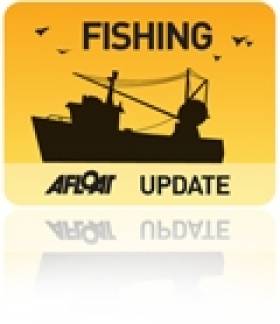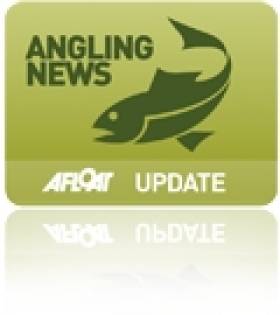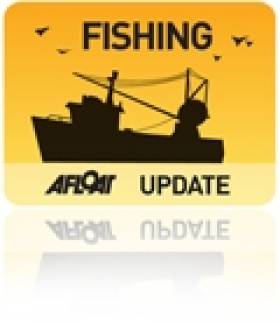Displaying items by tag: whiting
Ireland Pushes EU Fisheries Commissioner on Norway Whiting Row
The Irish Fish Producers Organisation (IFPO) has met the EU Fisheries Commissioner in Brussels to demand they reject Norway’s request for unilateral access to Ireland’s blue whiting grounds.
The demand comes as ongoing Norway-EU fisheries negotiations run over time, partly due to the blue whiting row.
Afloat reported previously how the EU Commission had moved to quell fears over talks with Norway on fish quotas off the Irish coast.
IFPO chief executive Aodh O Donnell says Norway’s request “is NOT part of their existing agreement with the EU. Instead, they are seeking, for a second consecutive year, additional and unfettered access south of the 56-degree line of the Irish Exclusive Economic Zone (EEZ).”
“Specifically, Norway – who are not EU members - are likely to have an 81 % increase in their quota next year. They want to catch a large share of that quota in Ireland’s rich Blue Whiting grounds. In making this demand, Norway is not offering any reciprocal access to their own fishing grounds for Ireland.”
“At this time, neither is the EU seeking reciprocal arrangements for Ireland, to balance the blue whiting access request from Norway. We understand the whiting may now form part of an overall agreement that includes arctic cod quotas from Norway to the EU. However, shockingly, it appears these cod quotas will mainly be allocated to other EU member states. In other words, Ireland will pay the price but will not make the reciprocal gain. So, it appears that we must fight alone for fair play.”
Mr O'Donnell says the failure to resolve this row, which has received international media coverage, “is a source of serious disquiet and uneasiness for the Irish Seafood Sector.” He visited Brussels this week on the invitation of Fine Gael MEP, Colm Markey, who has maintained a close watch on the blue whiting issue.
Aodh attended a meeting of the EU Fisheries Committee in Brussels on Thursday December 1st at which Colm Markey raised Irish concerns about the EU -Norwegian negotiations. The MEP also facilitated the introduction to the EU Fisheries Commissioner, Virginijus Sinkevičius.
‘’We are in a difficult space as the negotiations are conducted by the EU, and Ireland has a limited input in the final outcome. It was heartening to have Colm support the sector at this important time and to work hand in glove with us to raise awareness of this matter at EU Level.!
“The blue whiting request was raised by Colm Markey at a Committee on Fisheries, which was chaired by Pierre Karleskind, Renew Europe Group. This meeting was attended by the EU Fisheries Commissioner for the annual end of year exchange of views. This was an opportunity for the Irish case to be presented and the importance of this issue highlighted.”
“Colm and myself were afforded a further opportunity to engage with the Commissioner after the meeting. Commissioner Sinkevičius showed an understanding of the issues and was well appraised of the concerns of the Irish Seafood industry.”
O Donnell added that he was ‘’very grateful to the Commissioner, Colm and his team for facilitating this engagement. I am also satisfied that the wheels are in motion to have further meetings on this matter and other key issues in the near future.”
“It is imperative that the seafood industry maintains a united front to communicate the needs of coastal fishing communities and the considerable spin off industries that are linked to the sea. We are an island nation, and the marine sector has considerable development potential as we maintain the commitment to sustainability and securing a fairer share and access to our marine resources. “
Fishing Industry Welcomes Selective Nets, Grant Aid at Irish Skipper Expo
#FISHING - Minister for the Marine Simon Coveney briefed the Irish Skipper Expo in Galway last weekend on a new initiative promoting the use of selective conservation fishing nets, which allow young fish to escape.
Under the initiative in the Celtic Sea, additional quotas of up to 25% will be made available by the minister to skippers of Irish fishing boats which use an escape panel in their nets, allowing young whiting and haddock to escape.
The escape panel, developed by the Irish industry, has been endorsed at EU level and is expected to be a mandatory requirement later in the year.
Minister Coveney said on Saturday: “The use of this panel will significantly reduce discards of juvenile whiting and haddock in the Celtic Sea, allowing juvenile fish to grow and mature and contribute to increased stock size and returns for fishermen in future years.
"I believe that this offers an example of a practical approach to dealing effectively with the discards problem and retention of a flexible quota allocation system that we should take forward in the context of the Common Fisheries Policy Review."
In other news, Bord Iascaigh Mhara (BIM) announced €1.5 million in grant aid for the Irish fishing industry at the expo.
A spokesperson for BIM confirmed to the Galway Independent that the funding will be available to industry through a variety of schemes including fleet safety, seafood environmental management, lobster V-notching and coastal action groups.
Over 100 companies displayed their products and services to fishermen at the Irish Skipper Expo International 2012, held at the Galway Bay Hotel on 24-25 February.
- Fishing
- commercial fishing
- Minister for the Marine
- Simon Coveney
- Irish Skipper Expo
- Skipper Expo International
- 2012
- Galway Bay Hotel
- Galway
- conservation
- selective
- quota
- Celtic sea
- initiative
- discards
- grant aid
- Bord Iascaigh Mhara
- BIM
- Funding
- Coastal
- Seafood
- whiting
- haddock
- juvenile fish
- Common Fisheries Policy
Wexford To Host Winter Shore Angling Festival in January
#ANGLING - The 24th Winter Shore Angling Festival will be hosted on Co Wexford's east-facing beaches from 26-28 January, the Gorey Guardian reports.
Ireland's Dave Roe will be aiming to repeat his winning effort last year in a strong field of contenders that will also include UK match angling greats Alan Yates and Chris Clarke.
Codling, whiting, dab, coalfish and rockling will be the top catches over the weekend competition, which last year had a total prize fund of more than €8,000.
And even those not competing will get a lot out of watching the best match anglers using the latest equipment and techniques to gain the edge over their opponents.
The festival entry fee is €150 and includes a presentation dinner. For further details and entry information, contact Warren Doyle at 086 806 9961 (evenings only) or [email protected].
The Gorey Guardian has more on the story HERE.
Study of NI Waters Shows Cod, Whiting at Lowest Levels
A new study of Northern Ireland's waters has found that stocks of cod and whiting are at their lowest ever recorded levels.
The Northern Ireland State of the Seas report, launched by NI environment minister Edwin Poots and agriculture minister Michelle Gildernew, showed that while herring and haddock stocks are improving, some species remain "seriously depleted", according to the Belfast Telegraph.
"This is a key time in managing our marine environment," said minister Poots. "We have an extremely rich and varied coastline with the marine species in our seas contributing to over half the overall biodiversity in Northern Ireland."
The report also evaluates the potential of other marine resources such as tourism, beaches, shipwrecks and renewable energy - all of which will contribute to new planning laws covering the marine environment.
The Belfast Telegraph has more on the story HERE.


























































